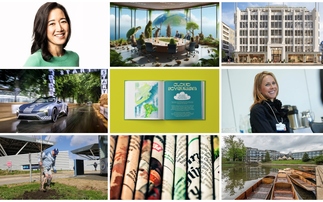Andre Veneman of AkzoNobel says increasing urbanisation offers huge challenges - and opportunities - for businesses
Meeting the twin global challenges of more people and dwindling resources are the key issues facing house-builders today. But with over nine billion people estimated to be on our increasingly resource-scarce planet by 2050, these issues are expected to be even more critical in the future.
This situation is exacerbated by the dramatic rise of new middle classes across the world, all demanding higher standards of living - wanting air-conditioned and comfortable houses, cars, computers and the latest communication equipment.
Rapid urbanisation is also driving change - it is estimated that every week a new city of 1.5 million people will have to be built over the coming decades to meet this demand. And by 2030, 70 per cent of the world's population will live in mega-cities. Perhaps more significantly though there are approximately two billion people today that do not live in decent houses, that do not have access to electricity or safe drinking water and sanitation.
If we are to improve the lives of these groups and if we are to meet the demands of the new middle classes and an increasingly urban population, what changes need to happen?
Many commentators believe that the answers lie in the creation of so-called smart cities that encourage economic development, modernize infrastructures and create a new urban model. The development of these cities which offer smart housing, smart grids, smart transport and smart agriculture is a great challenge but also a big opportunity for business and society at large.
Looking in more detail at the housing sector, in the developed world the process of retro-fitting to upgrade and improve resource efficiency will be very important. And providing effective insulation, access to renewable energy and supplying clever water recycling systems will ultimately need to become standard for all housing.
But perhaps the greatest challenge (and opportunity) lies in new housing - the majority of which will be constructed in the emerging economies. For instance in China, the government wants to facilitate the expansion of Beijing's population from 20 to 40 million, whilst still maintaining the same footprint.
The sustainability aspect of this plan has been implemented not because the government officials are environmental activists, but because they know that they have no other option. Beijing will simply not be habitable in the future without measures such as these. This plan will largely be achieved through new legislation and tightened regulations. To be a successful house-builder in Beijing, you will need to build houses which are much more energy efficient, using more renewable materials and providing access to renewable energies.
Across the globe environmental legislation is increasing and this is impacting the sector. In the EU, the European Climate Change Programme (ECCP) has set 2020 targets of a 20 per cent reduction in greenhouse gas emissions versus 1990 levels, a commitment that is being implemented through binding legislation. At the same time, the EU Emissions Trading Scheme puts a cap on carbon dioxide emissions, simultaneously creating a huge trading market for carbon allowances.
Standards such as the BRE Environmental Assessment Method (BREEAM) measurement rating system for green buildings in the UK, LEED in North America, Green Star in Australia, and HQE in France are also helping to drive significant changes in the housing sector.
As house-builders grapple with the demands placed on them to develop more sustainable housing, they will increasingly look to their suppliers to help them meet this challenge. So whether you are a cement provider, a renewable energy supplier, a glazing company or a paint and coatings company like AkzoNobel, there are great opportunities to play a key role within this sustainability drive.
Historically though it has been quite difficult for building companies to work effectively with their suppliers as they often have to deal with over 150 of them for any one project.
Suppliers that offer more integrated solutions, bundling many different solutions together, will stand to benefit.
Over time, house-builders will come to rely on fewer suppliers who are able to make a significant overall contribution to the environmental performance of a building. Taking this further, different suppliers who can work together in partnership have the potential to provide a very powerful proposition, taking care of a significant proportion of a house's sustainability criteria. And it will be those suppliers that take a pro-active approach to bundling products together, that are prepared to work with other companies that will ultimately reap the rewards.
As a supplier to this industry what we must ask ourselves is, how can we work towards its changing needs? If the housing sector is to become energy and carbon neutral with full recyclability of raw materials then at AkzoNobel we need to produce insulation materials, wood protection materials and heat reflective materials to service this sector. And if we look more widely through the lens of innovation, and work together with our customers, the transformation to an energy-efficient, low carbon economy is certainly possible.
But to satisfy the requirement of their customers, suppliers must also ensure their own house is in order - they must become much more energy and resource efficient in their own operations. And this must happen across the whole value chain - from their own suppliers through to their own operations and processes. They must become much less dependent on fossil fuel based energy and the non-renewable raw materials used in products.
Today at AkzoNobel 33 per cent of our energy comes from renewable sources (hydropower, solar, wind and biomass) and the aim is to increase this to 45 per cent over the next decade. Already 10 per cent of the raw materials that AkzoNobel uses come from renewable sources and we want to increase that share in order to be less dependent.
Increasing our own operational efficiency is also a vital part of this process and at AkzoNobel we have a dedicated operational eco-efficiency program designed to significantly improve our performance in this area.
This initiative forms part of a commitment over the past ten years from AkzoNobel to improve the energy and resource efficiency of every area of the business, from operating processes to compliance issues. However we recognise the need to accelerate our commitment to address the key mega trends that our customers in the housing sector are experiencing (as described above). This is why a new accelerated approach, announced as part of the company's corporate strategy update on 20 Feb, has been developed with the aim of creating ‘more value from fewer resources'.
Ambitions for 2020 have been defined as part of this approach including a target to reduce carbon emissions by 25-30 per cent per ton of product and a commitment to produce 20 per cent of our revenue from eco-premium products, by 2020 (base 2012). Of course none of this can be achieved without working together in partnership with suppliers, customers and other business partners.
Ultimately by collaborating effectively across the whole value chain, we can accelerate the path toward becoming truly resource and energy efficient.
Andre Veneman is corporate director of sustainability and HSE at AkzoNobel
This sponsored content was provided by AkzoNobel





